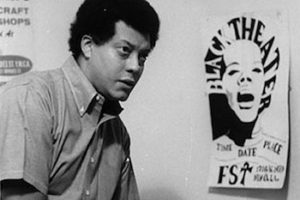
Tom Dent
*Tom Dent was born on this date in 1932. He was a Black poet, essayist, oral historian, dramatist, and cultural activist.
Thomas Covington Dent was the oldest of three New Orleans, Louisiana sons, including Benjamin and Walter. His parents were Dr. Albert Walter Dent and Ernestine Jessie Covington Dent. Tom and his brothers grew up in a socially aware southern family. His father was president of Dillard University, and young Dent was groomed to become a major figure in the Black professional world. In 1947, he graduated from Gilbert Academy, a college preparatory school for Black students on St. Charles Avenue in New Orleans. He then graduated from Morehouse College with a B.A. Political Science, in 1952.
At Morehouse, he was the editor of the literary journal Maroon Tiger. He did graduate work at Syracuse University's School of International Studies (Maxwell School of Citizenship 1952-56), where he completed his doctorate. After two years in the United States Army (1957-59), Dent moved to New York in 1965. There, he worked as a reporter for a Harlem newspaper, the New York Age, and as a social worker for the New York Welfare Department. He also worked as a press attaché and public information director for the NAACP Legal Defense Fund (1961-63), assisting Thurgood Marshall. While in New York, Dent was active as a political and cultural activist. He demonstrated at the UN supporting Civil Rights and anti-colonial struggles.
1962 Dent founded the New York-based Umbra Writer's Workshop, the first major post-sixties organization of Black writers. In 1965, he returned to New Orleans and became associate director of the Free Southern Theater (FST) until 1970. Dent founded the FST Writing Workshop and the Southern Black Cultural Alliance (SBCA). After leaving FST, Dent founded the New Orleans-based Congo Square Writer's Union and edited the Black River Journal. From 1968 to 1970, Dent commuted to and taught at Mary Holmes College in West Point, Mississippi. In 1969, along with Dr. Jerry Ward and Charles Rowell, he founded Callaloo, A Quarterly Journal of African and African American Arts and Letters.
He contributed articles and plays to the then-fledgling Black Collegian Magazine in the early seventies. From 1971 through 1974, Dent served as public relations director for the New Orleans antipoverty agency; awarded an MFA in creative writing from Goddard University and a Whitney Young Fellowship in 1974. From 1979 to 1981, he was the Marcus Christian Lecturer in Afro-American Literature at the University of New Orleans. Dent produced two books of poetry, Magnolia Street (1976) and Blue Lights and River Songs (1982). Additionally, he wrote some plays Negro Study No. 34A (1970), Snapshot (1970), and Ritual Murder (1976), which is now considered a classic of New Orleans theater.
Between 1978 and 1985, he conducted oral histories of Mississippi Civil Rights workers, and in 1984 conducted an oral history of New Orleans and Acadian musicians. The tapes from both collections are now housed at the Amistad Research Center in New Orleans. From 1984 to 1986, Dent worked as a writer on Andrew Young's autobiography, An Easy Burden. Dent worked on the Mississippi Oral History Project in the nineties, focusing on local Mississippi participation in the American Civil Rights movement. From 1987 to 1990, he served as the Executive Director of the New Orleans Jazz and Heritage Foundation. During the 1990s, Dent traveled in the Caribbean and Africa, investigating cultural connections between the African heritage cultures of the Diaspora and Africa.
At his death, Tom Dent was working on two journals: a collection of reflections on New Orleans and a series of personal essays on the connections and disruptions between Africa and African Americans. Dent's last and most important book was Southern Journey (1996). He lived and worked to document and accurately tell the story of his people's struggles, dreams, and achievements. Tom Dent died of complications from a heart attack on June 6, 1998, at Charity Hospital in New Orleans.
Dent Family Collection,
Will W. Alexander Library,
Dillard University,
New Orleans, LA